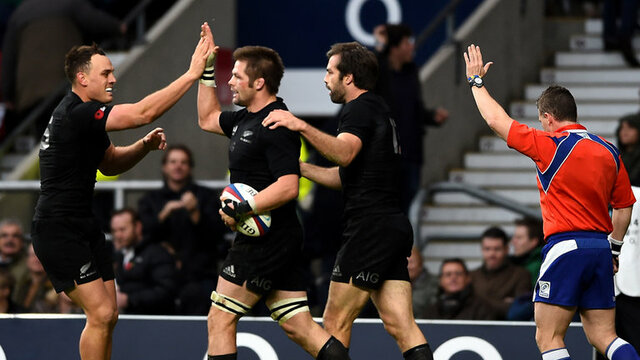‘They are only human’ insisted a succession of England players this week, confident they had finally demystified the All Blacks during a closely-fought albeit fruitless series back in June.
Think again. These guys may well be made of flesh and blood but they are super human.
Pace, power and patience were their calling cards in a brutally intense clash at Twickenham and those characteristics propelled them to a fifth successive victory over England and denied their hosts a priceless psychological blow in their last meeting before next year’s Rugby World Cup.
England will no doubt be frustrated following another narrow defeat to the world champions having rattled them throughout a thrilling first half during which they denied them territory and possession – and time and space when they had the ball.
They wasted no time in taking the game to the All Blacks and their impressive tempo appeared to banish question marks as to whether they could match the pace of a side fresh from another successful Rugby Championship campaign.
The hosts’ breath-taking endeavours soon brought reward in the form of an outstanding try from winger Jonny May who burned his way through the All Blacks’ defence with a scintillating turn of speed that left the usually resolute Conrad Smith and Israel Dagg flapping at thin air.
His gliding run had an already fired-up home crowd on their feet and it was a beautiful reminder of the damage sheer pace can cause – just moments after a thunderous collision between two other speedsters – England debutant Semesa Rokodugunand New Zealand’s Julian Savea – illustrated the equally enthralling power aspect of the modern game.
Buoyed by their success, England went looking for more, kicking to the corner before peppering the All Blacks line. But time and time again they were repelled by a defence that had wasted no time in recovering its composure and when England did finally work an opening out wide, fullback Mike Brown failed to take a poor pass cleanly and the chance was gone.
The game was clearly not lost in that moment but that costly lack of a clinical edge was magnified when Aaron Cruden crossed for New Zealand just a few minutes later following his side’s first foray into the England 22.
England also responded well to conceding a score with fly-half Owen Farrell’s boot giving them the lead once more but crucially his side could not put enough daylight between them and the All Blacks.
Learn place kicking technique from Dan Carter
Given England’s lung-busting first half endeavour, the fear was they would struggle to reproduce that same level of intensity after the break and so it proved. But they had little say in the matter as the All Blacks took a stranglehold on the game, taking their turn to deny their rivals possession, territory while as the same time conjuring their second try that was scored by their captain Richie McCaw.
England refused to buckle but what pressure they could exert did not result in the uncharacteristic poor passes and kicks we saw from the All Blacks in the first half. Instead we witnessed an arguably more telling moment of indiscipline.
New Zealand hooker Dan Coles did not take kindly to a tug from his England counterpart Dylan Hartley as he attempted to remove himself from a ruck and lashed out with his boot. It may be too harsh to call it a stamp but he clearly made contact with England scrum-half Danny Care and was quite rightly sent to the sin-bin for dangerous play. Why Simon McDowell, the Television Match Official, did not feel comfortable recommending such a sanction is a little puzzling.
This could have been costly with New Zealand holding a narrow two-point lead at the time, but remember this is the All Blacks. McCaw and his men simply doubled their efforts and the only change to the scoreboard during Cole’s absence was a penalty for New Zealand replacement No.10 Beauden Barrett.
As so often appears the case, the All Blacks saved their best until last. As the rain continued to poor and with a five-point lead on the scoreboard they hypnotised England with a run-ruck-repeat sequence that ran to an incredible 24 phases before replacement prop Charlie Faumuina crashed over for what proved to be a match-clinching try.
There was not one hint of panic as England slammed the door time and time again and their patience and enviable ability to perform the basic skills under intense pressure – from their opponents and the elements – propelled them to a deserved victory. It was a master class of how to play in the wet and windy conditions that had consumed Twickenham.
That failure to make numbers count is just one of the things that will add to Lancaster’s clear frustration this evening especially given the fact that a penalty try brought his side to within striking range in the closing moments of the game.
Success at the lineout and at scrum time also failed to provide the platform for victory which will leave him and his assistants scratching their heads but they have little time to ponder with the challenge of South Africa looming next weekend.
Sign up for 12 months membership to access 60+ videos covering all aspects of the game


